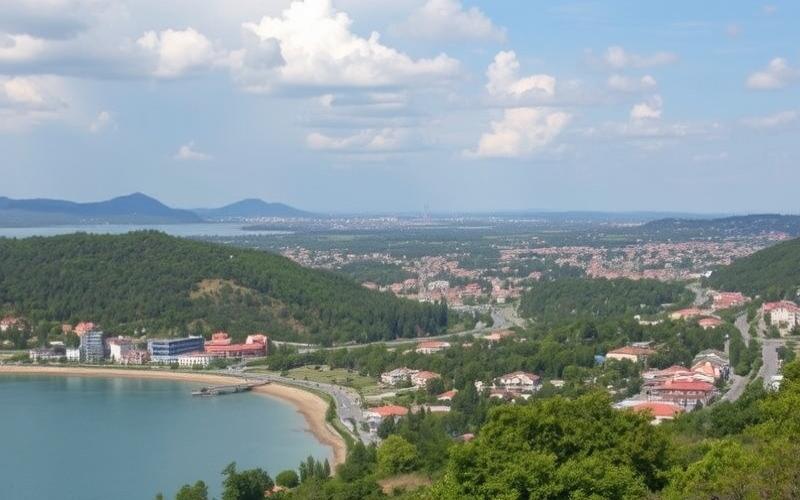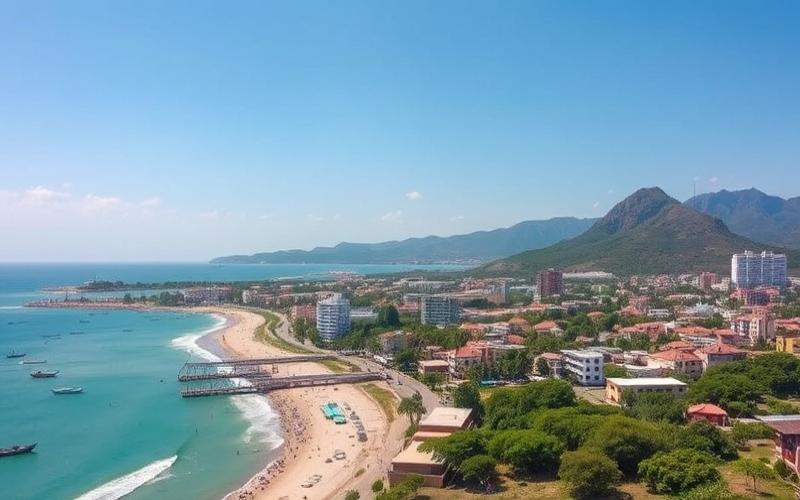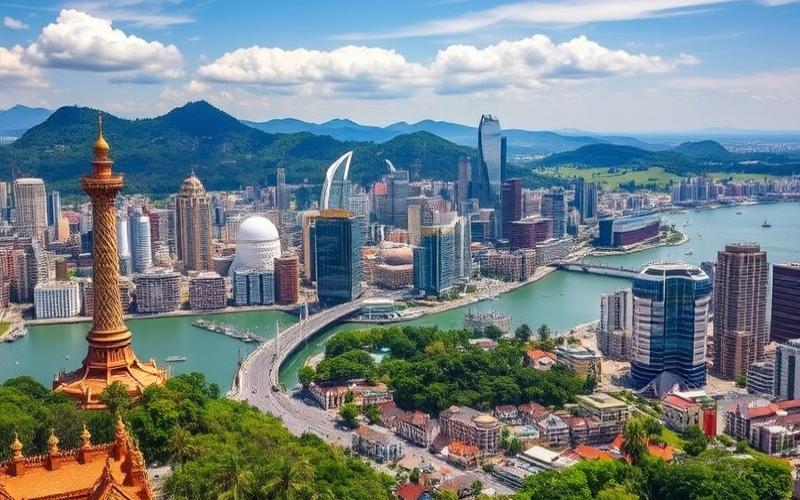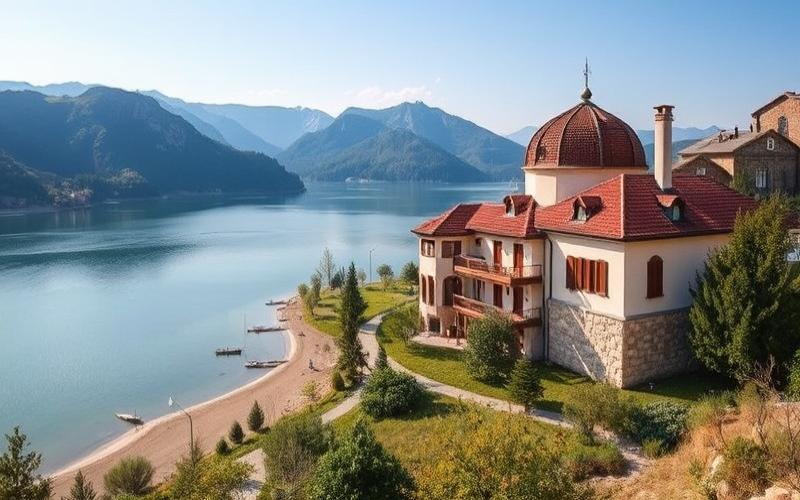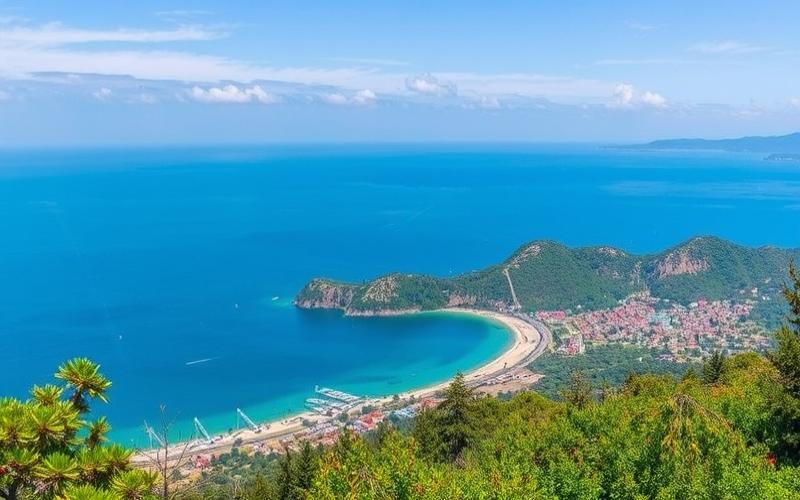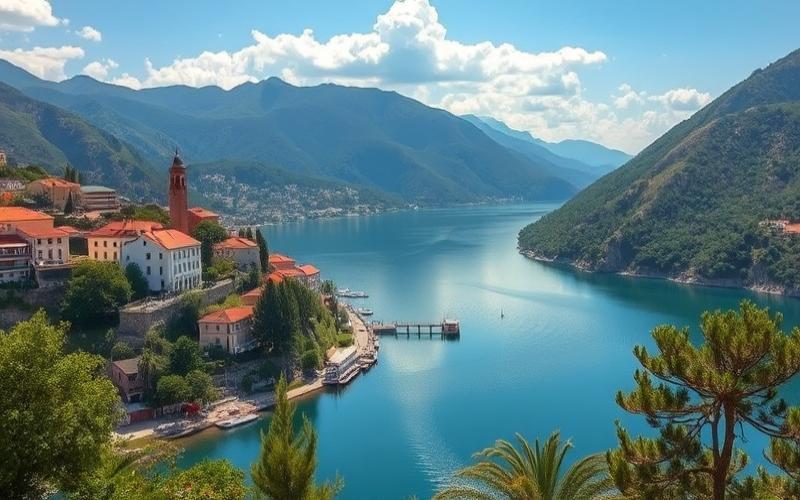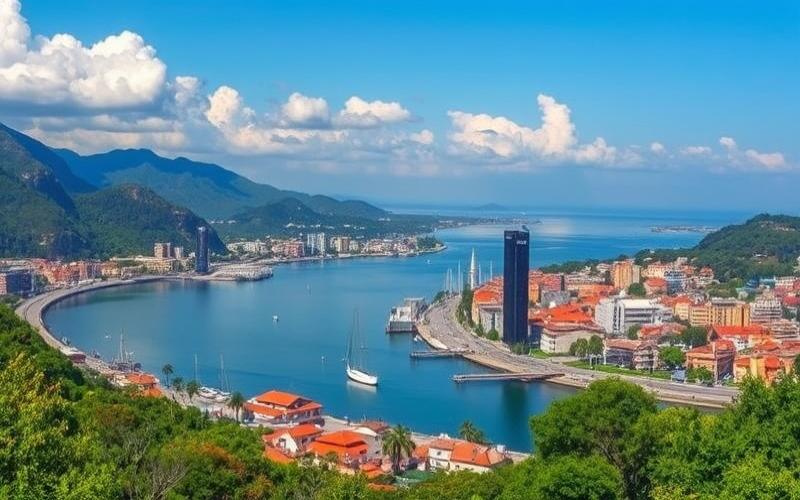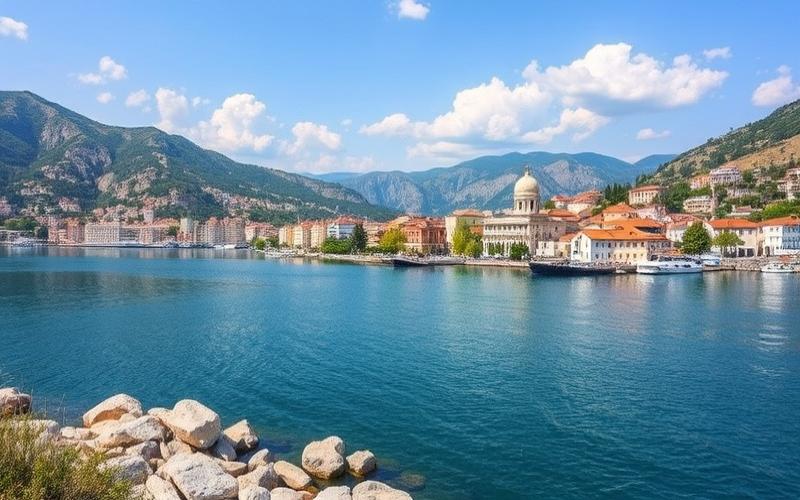
 Published on and written by Cyril Jarnias
Published on and written by Cyril Jarnias
North Macedonia’s industrial real estate sector is experiencing remarkable growth, positioning the country at the center of international investor interest. With competitive tax benefits and a skilled workforce, industrial free zones are emerging as essential strategic hubs for entrepreneurs seeking opportunities in Southeast Europe.
These zones offer modern infrastructure and optimal conditions for industrial development, attracting businesses across various sectors such as automotive, electronics, and logistics.
Maximize Your Investments in North Macedonia
Discover now which free zones you shouldn’t miss to maximize your investments in North Macedonia.
Benefits of Free Zones for Industrial Real Estate in North Macedonia
Free zones in North Macedonia play a central role in the attractiveness of industrial real estate through a set of particularly competitive tax, customs, and infrastructure benefits.
Main Benefits Offered by Free Zones:
- VAT Exemptions
- Corporate Tax Reductions (rates around 10%, among the lowest in Southeast Europe)
- Customs Duty Exemptions for most imported goods intended for production or re-export
- Simplified Administrative Procedures (one-stop shop for business creation)
- Priority Access to Modern and Suitable Industrial Infrastructure
| Benefit | Impact on Industrial Investment |
|---|---|
| Tax Exemption | Direct Reduction in Operating Costs |
| One-Stop Shop | Quick Setup, Fewer Administrative Barriers |
| Dedicated Infrastructure | Streamlined Operations, Increased Productivity |
Economic free zones are typically equipped with:
- Efficient Logistics Platforms
- Road and Rail Networks Connected to Pan-European Corridors
- Ready-to-Use Industrial Spaces with Shared Services (Security, Energy, Telecoms)
Concrete examples illustrate the success of the model:
Several international companies – particularly in the automotive, electronics, and food processing sectors – have established their industrial units in these zones. These installations have generated a significant increase in local skilled jobs and stimulated the regional economic fabric. The growing presence of foreign investors has also boosted demand for modern industrial real estate.
This dynamism translates into:
- Rapid Growth in the Logistics Real Estate Sector (“dark stores” and specialized warehouses)
- Sustained Appreciation of Industrial Assets Located in Free Zones
- Accelerated Development of Local Industrial Ecosystems
Future prospects remain very favorable due to:
- Continued Government Reforms Aimed at Further Strengthening These Tax Incentives
- New State Projects to Extend or Create New Free Zones Connected to Major European Markets
- An International Trend Marked by Partial Relocation of Industrial Chains to the Western Balkans
Thus, the Macedonian model stands out as a major catalyst for attracting foreign direct investment and sustainably enhancing industrial real estate, while ensuring local economic development.
Good to Know:
Free zones in North Macedonia offer significant benefits for industrial real estate, notably through VAT exemptions, corporate tax reductions, and customs duty exemptions, making these zones highly attractive to investors. These incentives have attracted companies such as Johnson Matthey and Kromberg & Schubert, which have thrived thanks to access to high-quality infrastructure essential to their operations. The rise of such investments has not only energized the industrial real estate market but also stimulated local economic development and foreign investment. Future prospects appear promising, reinforced by recent government projects aimed at expanding these free zones and further modernizing infrastructure, thereby solidifying North Macedonia’s position as a key destination for industrial real estate investment.
Logistics Warehouses: A Strategic Asset for Investors
Logistics warehouses play an increasingly central strategic role for investors in North Macedonia, particularly within the context of industrial free zones. Their importance is explained by several key factors:
- Supply Chain Support: Modern warehouses facilitate the management of goods flows, enabling rapid and reliable distribution to national and European markets. Geographic proximity to the European Union and the existence of well-established logistics networks strengthen this positioning.
- Improved Operational Efficiency: Having suitable infrastructure allows local companies, particularly in the textile or manufacturing sectors, to optimize their logistics costs while reducing delivery times.
- Increased Storage Capacity: The expansion of e-commerce and industrial growth significantly increase the need for space dedicated to the secure storage of both raw materials and finished products.
| Strategic Asset | Impact for Investors/Companies |
|---|---|
| Prime Location | Quick Access to European Markets via Highways/Rail |
| Modern Infrastructure | Reduction in Logistics Disruptions |
| Industrial Free Zones | Attractive Tax Incentives |
| Scalable Capacity | Flexible Adaptation to Growth or Seasonality |
Investments in well-located warehouses thus offer a true competitive advantage, thanks to:
- Optimal Connection with Regional Road Infrastructure
- Tax Incentives Offered in Free Zones (Partial Exemptions on Certain Taxes)
- The Possibility to Attract or Retain International Partners Requiring High Logistics Quality
“The presence of private warehouses owned by major European companies now makes North Macedonia an essential platform for quickly serving all of Central Europe.”
— Regional Manager of a European Operator
Concrete Examples:
- Several large textile groups established in the country cite their ability to deliver within 48 hours anywhere in the European Union as a major differentiating factor.
- A pilot project led by a German automotive company, thanks to a new automated warehouse located near Skopje, achieved a 20% reduction in its average shipping times.
By investing in these strategic facilities, both local companies and multinationals benefit not only from better operational control but also from direct access to tax advantages, thereby strengthening their regional competitiveness.
Good to Know:
In North Macedonia, logistics warehouses are emerging as indispensable strategic assets for investors, playing a key role in optimizing the supply chain and improving operational efficiency. Ideally located in free zones, these modern facilities significantly increase storage capacity for industrial companies, benefiting from robust transportation infrastructure and attractive tax incentives. Investment in such warehouses confers a significant competitive advantage, as evidenced by successful projects such as the Skopje Logistics Park, which perfectly illustrates the effective integration of new technologies to maximize efficiency and reduce costs. Testimonials from key industry players also highlight the positive impact of these investments, confirming their vital role in supporting companies seeking to expand in this high-potential region.
Maximizing Industrial Real Estate Returns in Free Zones
Free zones in North Macedonia play a central role in the country’s economic attractiveness. They are designed to attract foreign and local investors by offering an environment favorable to industrial establishment, with simplified administrative procedures and modern infrastructure. These zones thus contribute to job creation, regional industrial development, and the integration of North Macedonia into international value chains.
The tax incentives offered typically include:
- Partial or Full Corporate Tax Exemption for Several Years
- VAT Reductions or Exemptions on Certain Investments
- Tax Relief on the Import of Equipment and Raw Materials
In addition, logistics advantages translate into:
- Immediate Proximity to Major Road, Rail, and Air Routes
- Facilitated Access to Regional Markets (EU/Balkans)
- Presence of Suitable Infrastructure (Modern Warehouses, Integrated Customs Services)
These elements promote a significant reduction in operational costs for companies established in these zones, thereby increasing the potential for real estate returns due to the sustained rise in specialized rental demand.
Here is a comparative summary table:
| Free Zone | Location | Specific Assets |
|---|---|---|
| Bunardžik/Skopje | Near Capital | Major Investments, Recent Infrastructure |
| Tetovo | West | Cross-Border Connections |
| Štip | East | Textile/Logistics Specialization |
Among them, the Bunardžik free zone near Skopje stands out for its exceptional accessibility to national and international infrastructure. The state has invested heavily there to offer modernized roads, quick connection to energy networks, and integrated services intended for international industrial players.
To maximize real estate investment returns in these zones:
- Diversify Among Different Types of Assets: Specialized Logistics Warehouses (particularly adapted to the growing phenomenon of dark stores), Multi-Purpose Industrial Buildings, or Commercial Spaces.
- Carefully Select Potential Tenants: Specifically Target High-Growth Sectors like Automated E-commerce Logistics or Automotive Subcontracting.
- Continuously Adapt Real Estate Assets to Emerging Technological Requirements (Logistics Automation/Robotics).
Recommended Strategies:
- Prioritize Long-Term Leases with Large Industrial Companies
- Quickly Adapt to Technological Evolution to Always Offer More Added Value
- Negotiate Protective Contractual Clauses Against Regulatory Risk
Notable Example:
The American company Johnson Controls inaugurated a brand new factory in the Bunardžik free zone after an overall investment estimated at 30 million USD. This rapid establishment – completed in less than a year – demonstrates not only the local attractive potential but also its direct impact: massive creation of local jobs (+500) and notable improvement in land returns thanks to the international prestige brought by this type of major player.
Potential Challenges Encountered:
- Persistent Administrative Complexity Despite Some Local Simplifications
- Geopolitical Risks Specific to the Balkan Region
- Rapid Regulatory Changes That Could Impact Certain Tax Schemes
To Mitigate These Risks:
It is advisable to maintain constant legal monitoring, establish strong local partnerships (legal/fiscal advisors), and diversify assets geographically and sectorially to avoid exclusive dependence on the immediate local context.
This strategic framework therefore allows not only to fully exploit the dynamism offered by Macedonian free zones, but also to sustainably secure industrial real estate returns.
Good to Know:
Free zones in North Macedonia play a crucial role in attracting investors through attractive tax incentives, such as tax exemptions and administrative simplifications, combined with logistics advantages, which promote the maximization of real estate returns. Zones like the Technological Industrial Development Zones (TIDZ) of Skopje and Tetovo stand out for their advanced infrastructure, optimized accessibility, and strategic location near European transport corridors. To optimize return on investment, it is advisable to diversify the types of real estate assets and carefully select tenants, focusing on growing sectors such as logistics and manufacturing. Companies like Johnson Matthey have achieved notable success, significantly increasing their financial performance thanks to their establishment in these zones. However, it is essential to consider challenges such as local regulations and geopolitical risks by employing geographic diversification strategies and rigorous risk analysis to ensure a profitable and sustainable investment.
Disclaimer: The information provided on this website is for informational purposes only and does not constitute financial, legal, or professional advice. We encourage you to consult qualified experts before making any investment, real estate, or expatriation decisions. Although we strive to maintain up-to-date and accurate information, we do not guarantee the completeness, accuracy, or timeliness of the proposed content. As investment and expatriation involve risks, we disclaim any liability for potential losses or damages arising from the use of this site. Your use of this site confirms your acceptance of these terms and your understanding of the associated risks.






